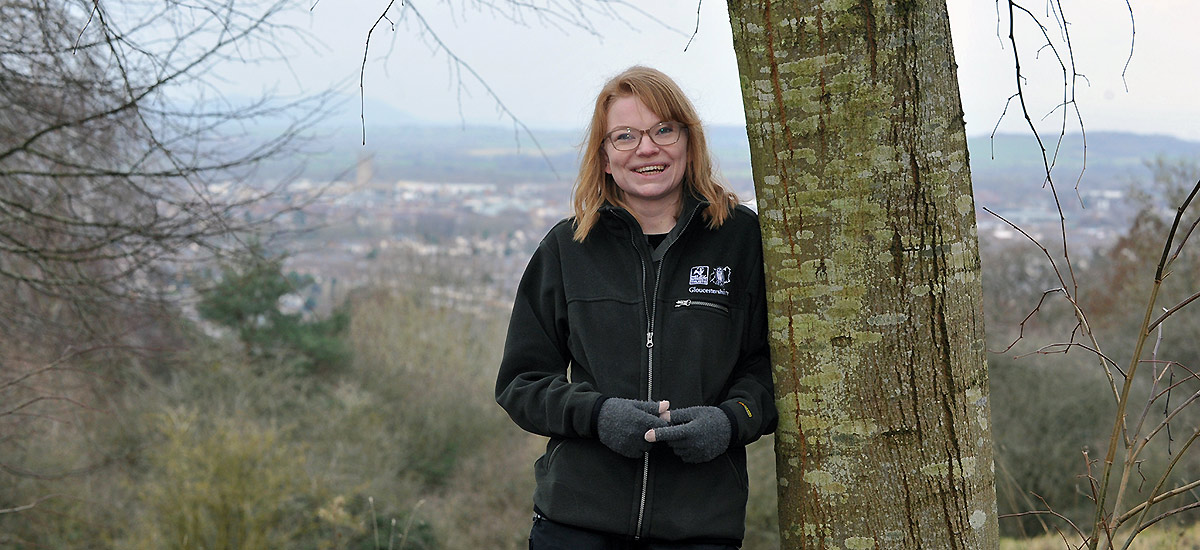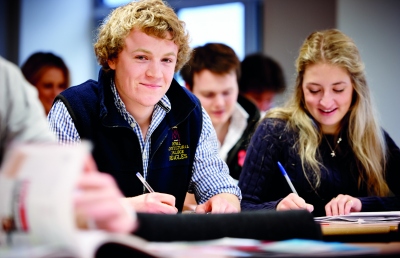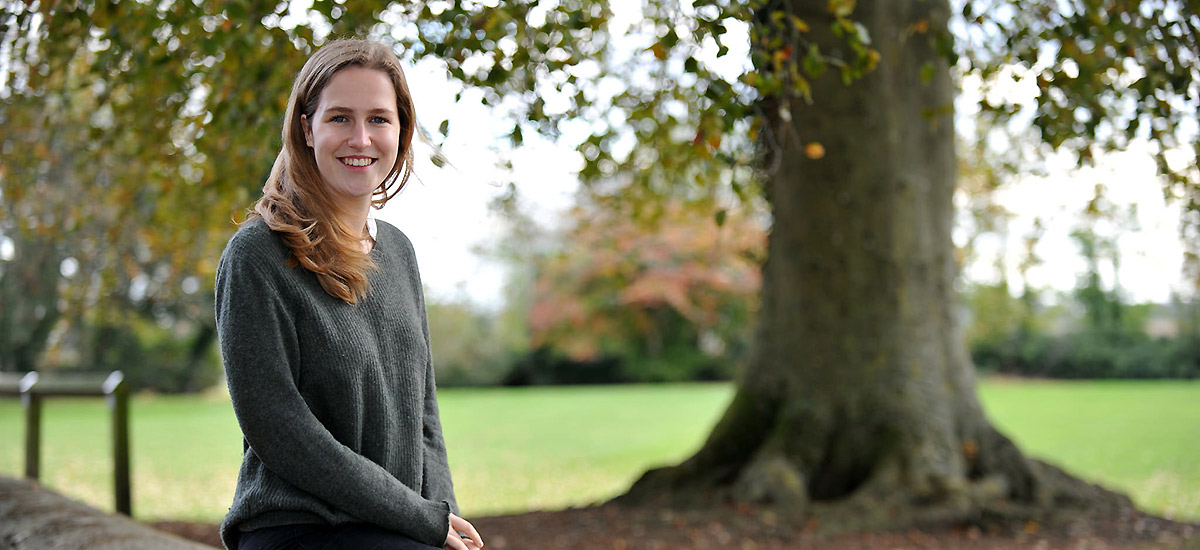Applications to study at the Royal Agricultural University must be made through the UCAS system. This applies to all full-time undergraduate courses and to all UK and overseas/international applicants.
All applications to study at the University are considered on academic grounds and candidates who may need additional support are encouraged to discuss their potential requirements with the University as early as possible in the admissions process to ensure these can be fully provided for.
The Royal Agricultural University is committed to providing equal opportunities for all of our students and we actively encourage potential students who may be disabled or have specific learning needs to apply to study with us. We aim to support students with additional needs by striving to provide services and facilities which create a fully inclusive environment.
Further guidance for students with disabilities or specific learning needs can be found here.
You may also be eligible for a contextual offer if you’re from one of our link colleges, have been in care, from a non-white ethnic background, live in an area with low progression rates to university or you are a veteran/child of an armed forces family.
Applying to study
Please complete your application by the UCAS deadline to ensure we are able to offer you a place on your first choice course. If you have missed the undergraduate application deadline of 14 January 2026 do not worry as you can still apply via UCAS, late applications can be sent through UCAS until 1 July.
You can apply online through UCAS where you can make up to five applications. Once you have submitted your application you can monitor its progress through UCAS Track.
The video on this page gives an introduction to the UCAS application process and how to write personal statements.
We are also happy to consider applications from students wishing to transfer from another university onto an RAU course. Details for how to transfer can be found here.
Grow your future
What to expect as a higher education student at the RAU
Studying at university is a very different experience from studying at school and college – it’s an exciting time and one that we are sure you’ll enjoy, but it is also a period of adjustment and its useful for you to know what university life is like and the expectations of staff and students.
The aim of any higher education programme is to introduce you to the most up to date developments in your chosen area of study, but a university qualification does so much more than that.
Subject knowledge is important but that can only take you so far; it's the practical application of this knowledge, alongside your skills and personal qualities, that will make you attractive to potential employers and set you up for success on your chosen career path.
At the RAU, we offer you so much more than a degree; we help you to develop skills and gain real-world experience that will give you a head start in the world of work when you graduate. These six key attributes make our graduates stand out amongst the rest:
Professionalism, resilience, innovation, global and environmental awareness, collaboration and business acumen
What does the academic year look like?
The Higher Education academic calendar is shorter than most school and college years, being just 28 weeks of timetabled contact time, split across two semesters. Each semester includes an examinations and feedback period at the end of each one.
Week 1 of the academic year starts at the end of September and there will be a continual run of 12 weeks until the break for Christmas, with the remaining week of semester 1 running through early January.
Semester 2 then begins and runs until the end of the academic year in May. In addition to these formal teaching weeks, there is also a Freshers' week and induction. The academic year is organised into two semesters with breaks for Christmas and Easter.
Academic year 2026 - 2027
Semester 1
| Dates |
Event |
| 20 September 2026 |
New students arrive in on-campus accommodation |
| 21 - 25 September 2026 |
New student induction |
| 28 September - 18 December 2026 |
Teaching |
| 19 December 2026 - 10 January 2027 |
Christmas break |
| 11 - 17 January 2027 |
Semester 1 exams |
Semester 2
| Dates |
Event |
| 18 - 22 January 2027 |
New postgraduate induction for Jan starters |
| 18 January - 19 March 2027 |
Teaching |
| 20 March - 4 April 2027 |
Easter break |
| 5 April - 30 April 2027 |
Teaching |
| 1 May - 16 May 2027 |
Private study |
| 17 May - 21 May 2027 |
Semester 2 exams |
Welcome and induction week
The Welcome and induction week is for first-year students and takes place the week prior to Week 1 (sometimes referred to as ‘Week 0’). Alongside the Students' Union we have organised a range of daytime and evening activities designed to help new students settle in, find their way around campus, become familiar with key members of the teaching team and Support Services and make friends. You will be given full details about your induction week and timetables prior to your arrival.
How will I be taught?
Studying at university is very different from school and college, with a much greater emphasis on independent study, however we recognise that this is a feature of university life that can take some time to adjust to.
Our approach to academic work encourages and supports the development of skills which will be not only essential for your time at university, but more crucially when you embark on your professional career.
What you can expect from us
Lectures form a large part of the taught activity, and certainly in the first year this may mean being amongst students from different courses who are studying the same modules as you.
Group sizes at this stage may be as high as 160 students, but alongside the lectures are small group seminars and tutorials where you will have the opportunity to explore key concepts in more detail, discuss topical issues relating to the key themes, and undertake practical activities that help set the theories in context.
To complement the lectures and seminars, there are also practical sessions, laboratory classes, off-site visits, case studies, guest speakers and field trips that may make up your timetabled activities depending on the modules you are studying.
Online learning resources
To provide you with every opportunity to engage with the subject we use our virtual learning environment where you can find all of the modules that you are studying that year, as well as a course page for your programme.
The module pages contain all of the information relating to that module - the teaching schedule, the learning materials, assessments, online activities, additional resources, which staff members are involved and how to contact them, and links to additional external sources of information.
The programme page has information relating to timetables, assessment schedules, course meetings and other relevant resources. There are also links to your timetable, and the various support services in the university.
Getting the most out of your RAU experience
For all taught activities there is an expectation that you will prepare before you come to the session. This may be simply reading though the materials that are going to be discussed, or it could be familiarising yourself with a particular problem that you will be working with.
It could be a fact finding exercise for you to bring to the discussion to complement the activity, or it could be preparing something that you will share with the rest of the group. Whatever the activity, this preparatory work is crucial to your enjoyment and development, and increases the depth and breadth of the learning experience as a result.
Work placements
For some programmes there is a requirement to carry out a work placement – the details of what kind of placement and for how long will be explained as part of your course, but this opportunity has proven invaluable to students for putting their studies in context and for applying their newly acquired knowledge and skills in the work place.
These modules are referred to as work based learning and almost all of them require an element of self-reflection to identify areas of progress or further training needs. If work based learning forms part of your course then this will be highlighted in the course information and can be discussed during open days.
What we expect from you
Part of the reason for studying at degree level is so that you are equipped with the knowledge and skills for a lifetime’s career. It is crucial for you to monitor and evaluate your own progress, take responsibility for your own learning and work collaboratively to solve problems, and undergraduate programmes help you to develop these skills.
It is your responsibility to get yourself to your lectures, manage your time effectively and prepare as necessary for your studies. Lecturers will of course be on hand to offer support and guidance, but they expect you to be as involved in this process as they are.
Often students will see their timetable and misinterpret the non-timetabled slots as ‘free time’. Whilst there may be room in your schedule for other activities, the time in-between lectures is there for you to work on assignments, group activities, prepare for lectures and seminars and deepen your understanding of the subject.
For every one timetabled hour, it is anticipated that on average two further hours are spent studying, so make sure you plan your priorities and use this time wisely. Of course there are many other things competing for your time and energy, and we want you to become involved with the social side of university life but make sure this is not at the expense of your place at university. Part of your development is the skill of time management and priority setting, which we can support you with.
Supporting your development
For every piece of coursework you carry out you will receive constructive feedback not only on the knowledge and understanding of your subject but also how well you have demonstrated the skills and abilities that we are looking for in our graduates.
These assessed activities contribute towards your final module mark, which in turn contributes towards your end of year mark – this is referred to as summative assessment and feedback. Your feedback is provided online so that you have a permanent record which is important because when you carry out your next piece of coursework, even if it’s in a different module, we will expect you to use your feedback to improve.
It’s important that you understand the feedback you have been given and ask questions to help develop your understanding. In addition to the online feedback it is highly likely that the lecturer will go through general aspects of the coursework with the whole group during face-to-face sessions or in a one-to-one, where appropriate.
To help prepare for these summative exercises there will be plenty of opportunities to practise the skills required for your assessments and gain feedback on your performance. These formative opportunities are extremely important and are usually embedded into lectures, seminars and the other activities that make up your course.
Feedback on these activities is usually continual and in a whole variety of forms – it may come from your peer group, question and answer sessions, one-to-one tutorials, exercises set in class or as a result of practising a skill and testing your abilities. The important thing is to recognise these as opportunities to learn more about the subject, how well you understand it and your ability to apply your developing skill set.
Supporting your wellbeing
When you first enrol, you will be assigned a personal tutor who will meet with you at least once a term, but you can request a meeting at any time. Meeting with your personal tutor offers the chance to talk through any issues, and may be all it takes to find a resolution for any challenges you are facing, but if necessary they are also able to guide you towards more specialist services.
Student Services encompass a whole host of personal, financial, health and well-being resources that can offer advice and support during your time at the RAU.
We have a team of academic support mechanisms to help with disabilities and identified learning needs. The important thing is to talk to your tutor early on about how we can best support you with practical solutions that help you achieve your full potential.






